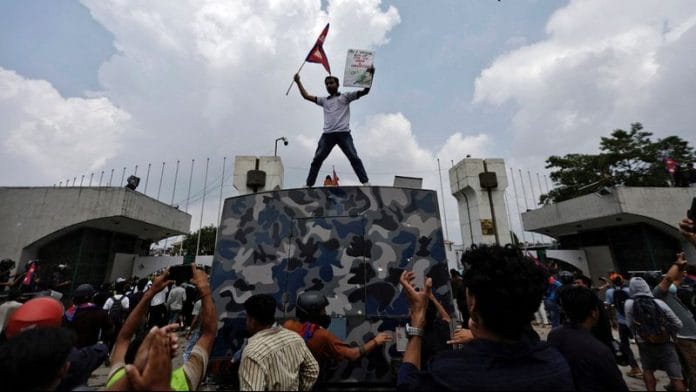The 80th session of the United Nations General Assembly was a missed opportunity for Nepal.
Kathmandu could have sent its newly appointed interim Prime Minister, Sushila Karki, to the debate. If not her, it could have sent a high-level delegation, which would have been important for several reasons.
It would have safeguarded Nepal’s international visibility, ensuring its voice remained on the global stage. It could also have helped secure diplomatic and economic opportunities like foreign investment, development aid, and strategic partnerships.
Moreover, it would have demonstrated political stability and continuity, signalling to global partners that Nepal remains a reliable and engaged participant despite internal leadership changes.
PM’s presence at UNGA was important
Since Nepal’s appointment of its first woman prime minister, hearing her vision for Nepal in the next six months would have impacted the global community differently. Often, in diplomacy, leadership makes a difference, and when one has an impactful leadership change, it needs to be reflected on international platforms such as the United Nations.
But Nepal’s views were addressed by the country’s Permanent Representative to the United Nations, Lok Bahadur Thapa, who empathetically highlighted the recent political developments following the Gen Z movement in Nepal.
“Earlier this month, Nepalese youth — in particular — took to the streets with a clear and compelling voice for change. Their call was not for narrow interests but for a renaissance built on the pillars of good governance: transparency, accountability, and responsiveness to the people,” Thapa said.
Further highlighting the demands of the Gen Z youth, Thapa added, “They demanded an end to corruption in public service, an equitable society, justice for all, and dignified job opportunities for the youth. It was a resounding reminder that the aspirations of a generation are nothing less than a fair, just, and prosperous Nepal.”
Speaking on the road ahead, he cautiously remarked that restoring peace, trust, and transparency would take some time. There could not have been a better opportunity to reflect on where Nepal stands today than at the United Nations.
Also read: In pictures: Victory for Nepal’s Gen Z has come at a cost. A nation bids goodbye to its heroes
Even monarchical system knew global stage was key
Nepal has historically been one of the active voices at the United Nations, and the leadership has often delivered pressing speeches. During the Panchayat era (1960-1990), King Mahendra, in a seminal speech at the 22nd UNGA in 1967, spoke at length about the challenges faced by smaller countries like Nepal.
“A small nation has a stake in peace: a small developing nation such as ours, which is obliged to mobilise all its human and material resources for development, has a vital stake in peace,” he said.
Mahendra was a fierce advocate of diversifying Nepal’s foreign relations and shifting Kathmandu away from its over-reliance on Delhi to Beijing. It was during his leadership that Nepal formalised diplomatic ties with China in 1955, and he carried forward foreign policy diversification throughout his nearly two-decade-long kingship.
While it was the era of monarchy, which was seen as a stable political institution, political movements were still shaping against the party-less and non-democratic Panchayati system.
Yet, despite internal challenges, the leadership understood the importance of a global stage in securing international legitimacy, attracting foreign support, and projecting Nepal as a responsible and stable actor in the international community.
There was also an acceptance that “though we have such a deep-rooted interest in peace, we have no means of preserving it alone”. The sentiment stands true even now, which is why the new leadership’s representation would have made a difference.
Also read: In Nepal, young dreams of serving in Indian Army crash as Agnipath halts a centuries-old tradition
Time for Nepal to have a dedicated foreign minister
The interim Prime Minister or a high-level delegation could have leveraged the UNGA forum to seek global support for reconstructing public infrastructure damaged during the Gen Z protests.
Conversely, no government has been toppled by a social media ban anywhere in the world, and there has been significant global attention on the events that unfolded earlier in September. PM Karki’s presence could have seized that opportunity to convey the events that led to it and outline ways in which the global community can help.
A serious attempt to use the UNGA could also have ensured Nepal’s voice was heard, given its status as one of the largest contributors of personnel to UN Peacekeeping Missions worldwide.
There is little doubt that the opportunity lay in striking the right chords to highlight Nepal’s contributions, advocate for international assistance, and strengthen its diplomatic visibility on the global stage.
Now, Nepalese missions abroad have begun fundraising to rebuild infrastructure damaged during the Gen Z protests. The Embassy of Nepal in Ottawa, Canada, has posted a public notice on X, asking overseas Nepalese, foreigners, and people of Nepalese origin to contribute, highlighting Nepal’s immediate needs.
The Gen Z movement in Nepal has exposed not just immediate factors like the social media ban as a reason for political change, but also underlying factors like corruption, governance failure, political instability, and lack of transparency in its public institutions.
The decision not to send a high-level delegation to the UNGA reflects how foreign policy often receives the least attention in Nepal, whether it is dealing with its two neighbours or building infrastructure to safely transport its people from conflict zones. For example, several Nepalese reportedly joined the Russian Army illegally to fight Ukraine.
Currently, interim PM Karki also holds the foreign affairs portfolio, but given the domestic challenges, Nepal may need a dedicated foreign minister to help create opportunities at home through investments and safeguard the interests of the country’s overseas population.
Rishi Gupta is a commentator on global affairs. Views are personal.
(Edited by Prashant)






